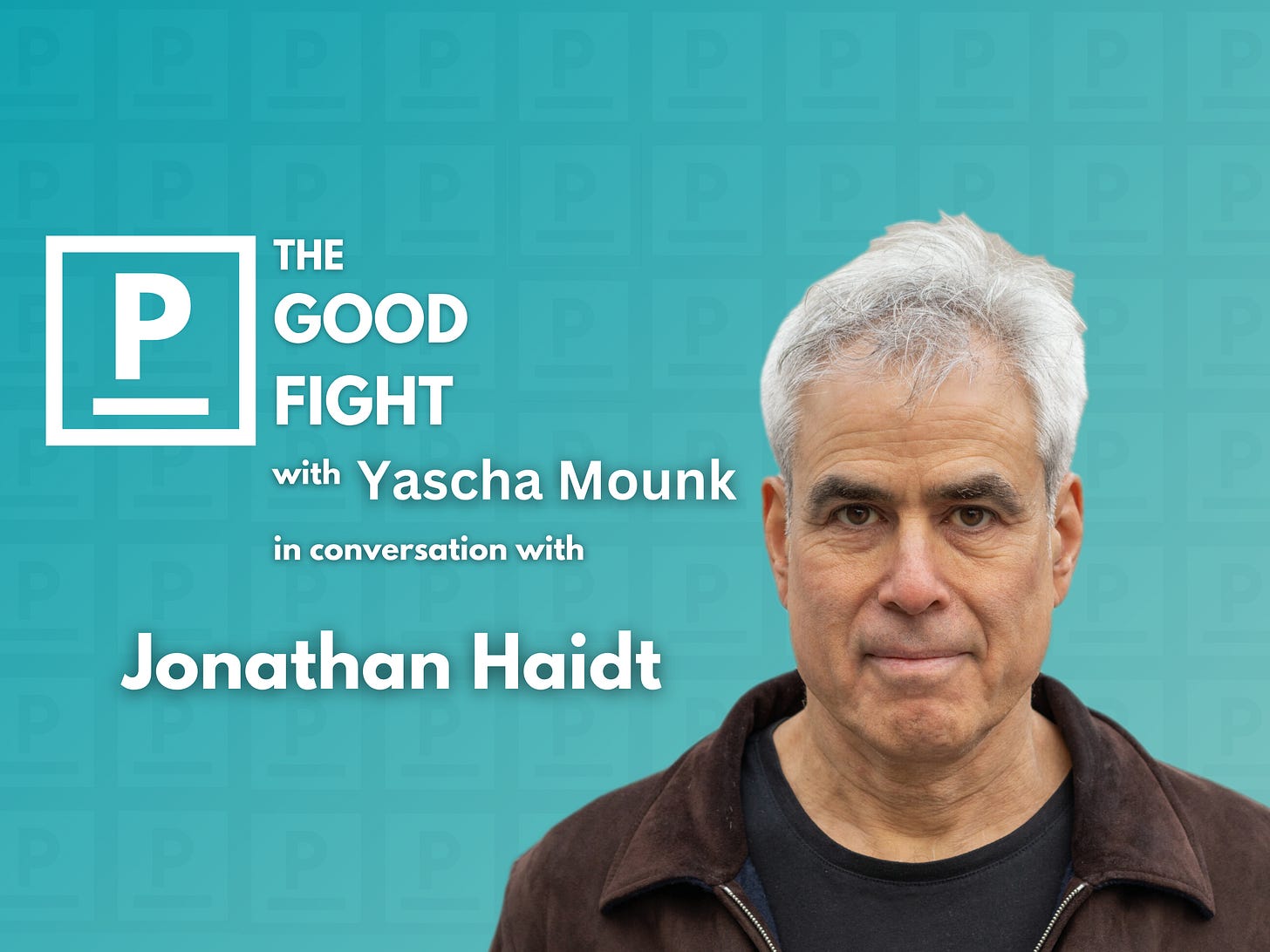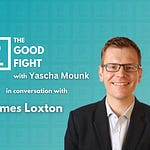Thank you so much for being a loyal listener to The Good Fight! Our hard-working team is taking a holiday for the last two weeks of August, so we’re sharing some of our favorite conversations from the last few years with you. Today, we’re sharing a conversation with Jonathan Haidt from 2021 that I’m still thinking about today. I hope you enjoy it.
We look forward to welcoming you back at the beginning of September, when we’ll have lots more exciting content—including a weekly episode of our new format, The Good Fight Club, featuring some of my all-time favorite podcast guests like Francis Fukuyama and Ivan Krastev discussing the news of the last week.
See you then!
Yascha & team
P.S: If you want to get access to all full episodes of the podcast, please support us by becoming a paying subscriber—and to celebrate the summer, we’re offering 25% off!
Jonathan Haidt is a social psychologist at New York University’s Stern School of Business. His books include The Righteous Mind, The Coddling of the American Mind (with Greg Lukianoff), and The Anxious Generation.
In this week’s episode of The Good Fight, Yascha Mounk sits down with Jonathan Haidt to discuss psychological differences between the left and the right, the human tendency to discriminate in favor of the in-group, and how to build a less tribal culture and country.
This transcript has been condensed and lightly edited for clarity.
Yascha Mounk: I first came to your work through The Righteous Mind, which I read one beautiful summer in my garden in Italy. So I have a vivid memory, as you do sometimes with books you read. I see the landscape in front of my family’s place in Italy when I think of you in the book. I have to say that it changed me a little bit because I’m somebody who’d done history as an undergrad and then political science and political philosophy and a lot of different disciplines, but I’d always been quite skeptical of psychology, social psychology, certainly evolutionary biology as things that might be helpful in us understanding the social world and the political world. I think your book makes a very convincing case for why we need to think about some of those things and some aspects of our nature to make sense of what the world looks like. So what drove you to look at the world through that prism? And what do you think we stand to gain from doing that?
Jonathan Haidt: Ever since I was a kid, I’ve always loved figuring out how things work. And I get an enormous pleasure when something sort of mentally snaps into place. And so when I was in graduate school at the University of Pennsylvania, I didn’t really identify with any sub-discipline of psychology. Early on, I began studying morality. At the time, moral psychology was mostly about developmental psychology. It was Lawrence Kohlberg and how kids develop their ability to think about justice. Carol Gilligan said, no, it’s not about justice. It’s about empathy or compassionate relationships. And that’s what the debate was when I started grad school in 1987. But I always liked to read widely. And so when I took a course from Alan Fisk, a really great cultural psychologist, I first read ethnographies, full length descriptions of non-Western cultures, practices around marriage or food or sex or anything. And I began seeing, wow, there’s all these similarities, like things I read in the Hebrew Bible, like the book of Leviticus about purity and sanctity. And actually, you see a lot of those practices in other cultures, and there’s something universal going on here. So I was really turned on by making connections between sort of moral psychology and development, along with anthropology, sociology. I first read any sociology in graduate school.
And then history, reading about ancient Rome and ancient Greece and how they had all kinds of purity rules. So I’ve always found it just a thrill to be a social scientist, meaning we’re interested in social phenomena and to understand them. You can’t just use one lens. Psychology is relevant to all, but it’s almost never sufficient. And so what is it that you discovered that we do have in common? And how does that sort of gel with some of the things that are specific about us?
Mounk: So one of the books that people have been reading in the last year, and we might discuss in the podcast sometime is what is called The WEIRDest People in the World, which shows that actually psychologists for a very long time have studied really weird people should say Western-educated, industrialized, rich and democratic. 19 or 20 year olds, undergrads at the University of Pennsylvania or at NYU where you are now, or at Johns Hopkins where I am—you get these people in the lab, you give them a bunch of tests and you deduce things about human nature.
But it turns out there’s things about living particularly in a modern, rich, industrialized society that makes people very different from what you might get if you speak to people in a village in Asia or in Africa. And so how do you square those two things? What is it about human nature that’s universal? And what is it that’s a specific artifact of the kind of environment in which we all live?
Haidt: That’s exactly the puzzle that I was working on in graduate school and for my whole career, which is ever since I read Richard Dawkins in college, it just blew my mind that with a few simple principles, you can understand the rich diversity of the biological world. And so I’ve always felt that evolution has a lot to tell us. But again, it’s never sufficient because we’re also cultural creatures. And that’s what’s so great about Joe Henrich’s work. So Joe Henrich, the author of The WEIRDest People in the World, is just brilliant at showing how we evolved to be cultural creatures. And then we have this whole second strand of evolution. Our DNA evolves, but so does our culture. And the two interweave. And I love that sort of thinking.
Thanks for reading! The best way to make sure that you don’t miss any of these conversations is to subscribe to The Good Fight on your favorite podcast app.
If you are already a paying subscriber to this Substack or Persuasion, this will give you ad-free access to the full conversation, plus the exciting bonus episodes we have in the works! If you aren’t, you can set up the free, limited version of the feed—or, better still, support the podcast by becoming a subscriber today!
And if you are having a problem setting up our podcast feed on a third-party app, please email our podcast team at leonora.barclay@persuasion.community.
So what really hit me in grad school was first, where all human beings, we all have the same evolutionary heritage. When I would read about purity and pollution practices on an island in Polynesia and see that they were similar to what the ancient Israelites were doing, you’ve got to say, wow, there’s something about the human mind that structures this. But then you also have to say at the same time, cultures can diverge. And as Henrich has shown, even in the West, huge divergence just in the last 500 years compared to how Westerners were even 1,000 years ago. So that’s what I really enjoy doing is telling a story that gets at both the universality and the variation.
A lot of people use the metaphor of language because obviously all humans have language and languages have many similarities, but also there are all kinds of switches, like do you put the verb at the end or the beginning? A lot of people have tried to say, well, morality is like language. Everybody’s got it, but we have different grammars. But I came to think that a better metaphor is taste or food or cuisine. It starts off really simple. We all have the same five taste receptors on our tongue. That is sweet, sour, salt, bitter, and umami, which is kind of a meat product. We all have the same five taste receptors, but we grow up in a culture that feeds us different cuisines and then we come to like different sets of tastes. Then there’s all the olfactory stuff, which is even more important. As I began to rest with how do you square the circle or reconcile the obvious similarity with the obvious difference, I began to use that metaphor. Based on the work of my postdoc supervisor, Richard Schwader, I took some of his theories and made them more evolutionary and developed what we call moral foundations theory, which is that just as our tongues were shaped by what our ancestors ate. So as primates, we love fruit and we have sweet and sour receptors that guide us to ripe fruit. That’s why we have them. Dogs don’t have them. You try to give something sweet to your dog, he doesn’t like it, you say, well, this is delicious. Why don’t you like it? Because they didn’t evolve to eat fruit. They only evolved to eat meat.
In the same way, humans have these five—there’s many more than that, but five main ones that we began talking about—care, fairness, loyalty, authority, and sanctity. And I think there’s also liberty and property. There’s a few others. But the five that we first talked about are the most obvious taste receptors for understanding, especially political divisions.
Mounk: This is set out really convincingly in The Righteous Mind. So we all have the same basic taste receptors. It may be that, just as dogs don’t appreciate fruit in the same way because they don’t have a receptor for it, there may be things that are outside of our repertoire as humans and there are ways in which all of those things speak to us. Perhaps there’s some tastes that we just simply don’t know at all. But the basic distinction is that if you grow up in a culture in which you barely ever eat spicy food and you’re just not used to it, and then suddenly you’re exposed to spicy food, you you may not like it because it’s not something that you sort of have come to appreciate in the same way.
When you think about our moral foundations, in a similar way, we all have a capacity to think through the world, through these basic categories of fairness, of sanctity, of equality, that different cultures put different sets of emphases on each of those. Now, tell us a little bit about those differences that you see across cultures. I understand that one thing is that in sort of WEIRD societies, in more modern and industrialized societies, we tend to give relatively less emphasis on sanctity and relatively more emphasis on things like fairness or equality. Is that broadly right and how can it help to explain the world?
Haidt: No, that’s absolutely right. So the metaphor here is that these are foundations. So you don’t live on the foundations of your house, you live in the house, but the house was built on certain foundations. And in the same way, modern Western morality is built especially on foundations of care and fairness. I think George Lakoff in one of his books, says something like, liberal morality is all about empathy. And you see this, if you look at speeches, you can usually tell whether they’re on the left or the right. If they talk a lot about fairness and compassion for the poor, and they talk a lot about fairness as equality. So you would build up all kinds of concepts on the left, let’s say.
Fairness on the left is often equality, including equality of outcomes. Whereas on the right, everybody talks about fairness, but it’s really clear that on the right, they generally mean proportionality. That is something like the law of karma. So on the right, there’s much more, do the crime, do the time, much more emphasis on punishment for free riders or shirkers. Now everyone’s hypocritical and everybody likes to point to the places where the other side, they say they care about this, but then they don’t in this place. But if you look at political rhetoric, generally speaking, you’ll find that those on the left are based much more on protecting individuals from harm and fairness, especially fairness as a quality.
Now, when you look around the world, because you gave the example of things that seem outside of our understanding, what you generally find is that the normal human society is built on all of these foundations. It will have all kinds of stuff to regulate the body. Almost every society has religion and religious practices have a lot about how you prepare to contact God or the sacred. And it usually involves bathing, physically cleansing. If you’ve just had sex or you’ve just defecated, you should not go into the temple.
This really blew my mind when I read the Quran, I read the Laws of Manu in Hinduism, I read a lot of ethnographies of societies before contact with Western civilization, and they almost always have this purity stuff. Now, you know, I’m an atheist Jew, I’m raised in the suburbs of New York City, I wasn’t exposed to any of this stuff. But here’s the cool thing, just as we can read Homer and we can understand it, even though we don’t live in an honor culture, we may not get all the nuances, but we can understand an honor culture if the author is great. We can understand people talking about sanctity and purity because we have the taste receptor, even though it’s not really used much. So this to me is one of the really fun things about moral psychology is you, it’s something like traveling around the world. You try to make sense of other people’s moral worlds.
Mounk: We’ve talked a little bit about the difference between modern industrialized societies and more traditional societies, but you also think that this really helps to explain the difference between the left and right in Europe or liberals and conservatives in the United States. What is the empirical research on that? How do we know that the conservatives, even within the United States, put relatively more emphasis on sanctity and liberals put relatively more emphasis on equality and so on?
Haidt: So the way I got into this, my dissertation was done in Brazil and the United States across social classes within each country. And it turned out that actually social class mattered more than country because if you’re educated in Brazil versus the United States, you’re not that different, but you’re actually very different from people in the lower class in your own country.
Mounk: There’s a great chart in Joe Henrich’s book where he asks people—this has become a little party trick of mine—to complete the sentence, I am in 10 different ways. And it turns out that, you know, probably a lot of listeners to this would say, I’m curious, I’m liberal, I’m conservative, I’m whatever your job is, whereas people in more traditional societies would say, I’m the son of so-and-so, I’m the father of so-and-so, much more relational kind of answers.
Now, in the United States, if you ask college students, about 80% of the answers refer to their qualities or their professions or things that they’ve sort of chosen for some extent of life. About 20% are sort of relational attributes like that. When you ask a laborer in Nairobi, about 20% are the qualities, about 80% are the relationships. When you ask a university student, a college student in Nairobi, the answers are very, very similar to those of American college students. So that, I think, is one of those indications both that this is as much a class as a cultural distinction and mixtures of how many people have the education and so on in the United States versus Kenya, for example. But also, I think, an argument for why it’s universal, why we shouldn’t think that this is a difference that will persist 100 years from now. Kenyans 100 years from now will be quite similar to Americans on many of those things.
Haidt: Yes, that’s right. But even 100 years from now, we’ll still find the difference. And so I’ll try to explain why I think that’s the case. So my original work was done across cultures and social classes. And especially when I started working in India, when I was a postdoc with Schwader, I spent three months in Bhubaneswar, India on the East Coast. And so all of my work originally was how nations and cultures vary.
In the late 90s, political polarization began to really increase in the United States. In the 80s, we had sort of the rise of the religious right. And I was very much on the left. And I just got interested in how this growing culture war in the 90s, and especially in the early 2000s, how the left and the right, it really was analogous to what I was seeing in sort of WEIRD cultures versus non-WEIRD cultures. So there’s a really good book, David Goodhart’s The Road to Somewhere. And it’s sort of what you were saying that most people are somewheres. They are rooted someplace. They have ties and they define themselves in terms of those ties. But there’s something about moving around and getting education that sort of rips all those roots out and you become this like, you know, almost billiard ball that can move around without being tied in. My former colleague at University of Virginia, Shige Oishi, found that students who simply had moved a couple times were much WEIRDer or individualistic than students who had never moved before they came to UVA. So mobility changes our minds and changes our cultures.
I began looking at how left and right were actually like different cultures. By 2004, we had different U.S. constitutions, different climate science textbooks, different history books. So I began looking at that. Originally, my hope was to actually help Democrats stop losing so much. After 2004, after John Kerry lost, I thought he should have won. One of the principles here is that the normal or default state of human minds and cultures is much more like those laborers in Nairobi, like the people I was working with in India. You have to really see people like us, well-educated Westerners and now increasingly Easterners as well, as the exception that needs explaining. And that’s what Joe Henrich’s book is about. We also have very direct proof. You asked, how do we know that left and right are this way?
Well, first, we have data from hundreds of thousands of people on multiple studies. With lots of different measures, we find that people who self-describe as liberal or left are different from those who describe as conservative on the right. The big difference is in loyalty, authority, and sanctity. It’s those three foundations, which American conservatives or British conservatives will endorse, but American or British progressives give very low ratings. Then this really cool study, there was a great graduate student at UVA, Thomas Talhelm. He came to me with this idea. He was working in China. He thought that actually liberals or people on the left are more WEIRD because Henrich’s weird paper had come out by this time. So we collected data on left and right in China and America using some of the measures that Henrich and cultural psychologists do. Sure enough, we found that conservatives are less WEIRD. If you’re on the left in whatever country, you are more WEIRD. That makes it harder to win elections because you don’t understand how most people think.
Mounk: This to me is certainly true about a lot of politics, especially on the left. You get the sense that a lot of them are driven by, according to an interesting study by Hidden Tribes, the tribe of progressive activists, who are about 8% of the population. They really, I think, have sometimes trouble understanding how people relate to politics, how they talk about things, how they process what they’re saying. But I have one thing that I’ve struggled with in what you just said, which is that I don’t know whether we are very good at capturing different notions of sanctity in a fair way. When I look at a lot of the left today, it doesn’t strike me that it has less of a sense of sanctity or less of a fear of moral pollution, or less of a sense of what we care about is not because of the impact, not because of the amount of consequences, but because this sullies us and we have to make sure that we’re not sullied in that kind of way. Now it depends on what kind of things you talk about. I mean, here’s one example that I think about, and I come more from the left. I think my sanctity detectors go off more on one of these things than the others. I’m not trying to say that they’re morally equivalent. But when the right talks about voter fraud—and I’m not talking about the crazy conspiracy theories of Donald Trump or whatever—but we don’t really ask people for their ID and so in theory somebody could vote who isn’t really allowed to vote. It strikes me that we have a disagreement here about whether we care about this consequentially or we care about this as a question of moral sanctity.
In terms of the consequences, I think every political science study is pretty persuasive that it’s a couple dozen people at most who do that in every election and it doesn’t particularly matter. It doesn’t affect the outcome. So who cares, right? But what people on the right might be saying is, well, but hang on a second, I care because only United States citizens should be allowed to vote. And it tarnishes the whole process. When some people go and vote and they’re not eligible to do that and we don’t stop them from doing it, you can talk to me as much as you want about how it doesn’t sway the outcome of the election. This is wrong and you should care. This is a sanctity argument. In similar ways—and again, I’m not saying that the two underlying offenses are morally equivalent—you have some of the same things on the left when there’s one person on a college campus who sprays a racial slur on a wall or something like that. I think there might be some people on the right whose moral sanctity isn’t triggered on this, who say, what is one asshole who did this and obviously that’s bad and we should punish them if they get caught but come on you know it’s one guy who cares, whereas a lot of people left have a sanctity response, which is, no we want to be a space that is free of racism and so we should care about it. So the question is, is it really that the left and the right have different amounts of caring about sanctity, or is it that different sets of things trigger the sanctity response?
Haidt: So the first thing to note is that the reasons why we make a judgment and the words we use to justify it are not closely connected. So people might feel funny about something and then they struggle to explain it. This is found in many parts of psychology, most vividly in Michael Gazzaniga’s split brain studies. If only the right cortex gets something, the left cortex will struggle to make up a story. So the fact that the right might use sanctity arguments about voting doesn’t mean that it’s truly a sanctity issue for them. Generally speaking, the more you expand the franchise, it’s going to be better for the left. And so the right is off trying to block that.
The second thing is we all have purity and sanctity taste buds. And my claim is just that the right generally builds on it more than the left does. What’s really cool to me is that there is this American civil religion, and maybe we’ll get to Biden later, but he really did a good job invoking that in his inaugural address. Everyone has the ability to treat the founding documents as sacred or certain ideas as sacred. I remember talking with people, I think it was in Brazil, about buying votes, because in many countries, politicians can kind of buy votes. And if you talk to Americans and say, what if somebody offered you $1,000 for your vote, would you do it? And people are horrified. It’s a horrifying thought because in America, the vote really has been invested with sacredness. Whereas people didn’t have that feeling. It’s like, yeah, sure, a thousand dollars, of course I would. So I do agree with you that a lot of our thinking on the left and right does involve sanctity, purity, inviolability. I do definitely agree with that.
Then the third point I would make about this is that you see the absence of sanctity thinking, especially in sort of center left and libertarian circles. In fact, we’ve got all kinds of data. Libertarians are the most rational, least emotional, least amount of magical thinking, very low on sanctity and purity stuff. But, especially on the center left, you have more of an utilitarian orientation towards ethics. And on the far left and the far right, you get much more of this seemingly magical thinking. That’s why you’ve got a certain kind of illiberalism on the right, which has been very much on display recently, but you have a different kind of illiberalism on the left. I think your example of a racial slur or a swastika painted somewhere on a campus—many would treat that as it’s been desecrated. Now we have to purify. So I do agree with you on that example. Everyone’s got it, but the degree to which they build their morality on it is different and they’ll sort of construct it out as slightly different materials.
Mounk: That’s a very interesting explanation and very convincing to me. One other thing that I want to hit on about that side of your work before we get into some of the more contemporary political concerns is the question about how our human nature pushes us towards groupishness and how we should deal with that. Growing up like you, Jewish, but in Germany, the idea of patriotism and nationalism has always been deeply anathemic to me. I, in many ways, thought that the right response to the most horrible episodes in history, including the Holocaust, but lots of others, including the genocide in Rwanda and so on, was to try and overcome any kind of attachment to groups. The best way of dealing with that is to be very, very skeptical of organized groups of any form, to try perhaps to be a kind of cosmopolitan who cares about people everywhere in the world, whoever they might be to the same extent.
There’s a very nice line in your book where you talk about how everybody at UVA at a certain point had coexist stickers on their bumper, but you realized that actually they were the coexist tribe, the tribe of people who are tolerant and they dislike people who are not tolerant in exactly the way that other tribes dislike each other. But more broadly, I think your book makes an argument that sort of being groupish is so deeply baked into human psychology that the right response is not to try and overcome that instinct, it is to think about what kind of groups are least likely to recover. What kind of groups are most likely to keep the darkest instincts of our human nature in check and allow us to maximize some of the good things that come from groups, like our amazing ability to cooperate as a human species. So make that argument for us because I’m still chewing on it.
Haidt: So it’s interesting the degree to which human nature has been controversial in the social sciences, because a lot of people fear reductionism, they celebrate diversity and difference. And I think a key to reconciling all of this is to say that human nature is deeply contingent. So I never say hardwired. I really don’t like that image of something hardwired. Rather, we have predispositions. The mind is sort of pre-structured, but it can change during development. And more importantly, we have all kinds of psychological mechanisms that only come out under certain circumstances. It’s not that we are hardwired to be tribal and therefore we’re always tribal. That’s not true at all. Even if you look at tribes or pre-contact societies, they’re really interested in getting to know other groups and exploring and trading and developing trade networks. So a useful metaphor here is the slime mold. It can exist as individual cells, but when things get really dry or there’s the danger of death, they all come together. Some of them form a stock that then releases spores that then go reproduce. That’s a good metaphor for human tribalism or sectarianism, which is we’re very good at doing every man for himself or being individuals and exploring and developing ourselves. But when a threat happens, boy, do we come together. And that’s what I wrote about in The Righteous Mind.
I was always on the left. Now I’m a center-left kind of person, but I was very much on the left, and prone to be suspicious of nationalism. But when 9-11 happened, it was like far back in my head, there was a panel that said, in case of foreign attack, break glass and take out this certain kind of nationalism. Part of the way that I think about human nature is that it gives us all these mechanisms. And then some cultures, especially if you grow up with gangs, you have a really strong sense of us versus them. If you grew up during wartime, you have a strong sense of us versus them. If you grew up during peacetime, as I did, you don’t have that strong sense, but it can be activated by the environment. And I think what we see is a left-right split and how readily that happens.
So to understand left versus right psychology, for the left, I always just think of John Lennon’s song, Imagine. Imagine there’s no countries, no religions, nothing to kill or die for. Also no property, there’s another verse. But there is a dream on the left of let’s erase all the walls and just all be together as one. That’s a beautiful dream, but people on the right think it’s naive, it would never happen, they’re more rooted, and there are positive forms of nationalism. I think you and I came down really on the same kind of view. A lot of other people, like around 2016, 2017, after the rise of populism—I have a whole collection of essays with Larry Summers, David Brooks, and Martin Wolf, saying, wait a second, don’t get rid of patriotism and nationalism, but there are forms where you can love your country that are very positive. German nationalism 70 years ago was structured as we love our country and all the others are threats, we’re gonna take them over. But American patriotism and American exceptionalism is, hey, we’re a nation of immigrants. We stand for democracy. So depending on how the nationalism is constructed, it can be a very positive force.
There’s also a basic finding in social psychology that when you do things to divide us versus them, you get a big increase in love of the in-group and only a small increase in hate of the out-group. For example, sports rivalries are actually very positive because Yankees fans will say they hate the Red Sox. It’s not very deep, but then their love of the team and of their fellow fans is really big. So I think there are positive forms of patriotism and nationalism and the left would be doing itself a disservice to just say no to that, all humankind is one.
Mounk: I’m ambivalent about nationalism and patriotism still. The way that I talked about it in my last book is as the sort of half domesticated animal that can do tremendous work for us, that can sustain a welfare state, that can sustain the fact that somebody sitting in Maine can sympathize in a special way with somebody sitting in San Diego, even though they may have a different gender and race and religion—I think is a really positive and amazing thing.
But I don’t distinguish between patriotism and nationalism. Some people say, patriotism is a wonderful thing, it has all these great things. And then nationalism is sort of Trump and all the terrible things. And I think sort of as two different ideal types, I agree with that. There’s a positive face of it and a negative face of it. But the step from one to the other, I think, is always very small. For me, it’s a question of an ongoing process of trying to domesticate it, this half-domesticated beast. It can always go wrong, but it’s better than the alternatives because we do have this instinct towards groupishness. We have an instinct towards forming groups when discriminating in favor of the in-group and punishing the out-group. When I look at the kind of options for the cultural expression of that we have at the moment, the one that seems to me least pernicious is an inclusive patriotism or an inclusive nationalism, as opposed to either a celebration of groups at the subnational level—which I think is part of pluralist democracy, of course—but when that becomes the only thing, it creates all kinds of problems for societies, or the attempt to just temper down all forms of groupishness, which I think will just allow the worst kinds of people to come in and sweep in and exploit it. But what do you think about that? If we say, look, groups can have this positive result, they can make people do these amazing things for the in-group, then how should people ideally split their allegiances in a pluralistic democratic society across the family, the town, the co-religionists, the people who share their ethnicity, the country as a whole?
Haidt: Well, so first, it’s not that there’s a fixed amount of identification, that if you give more to your country, you’re going to give less to something else. You have to look at it in a more dynamic way. When your country needs you or your country’s been attacked, then that becomes the salient identity. It’s really interesting to me that anybody who remembers World War II or grew up in the aftermath and was raised by people who remember it, at least in the United States and Britain and other countries, has a kind of patriotism, sort of love of country that I think is generally very positive. It was yoked to a moral ideal of fighting evil, and it really stayed with people for life.
When you look at 20th century liberals, you find this very positive form of patriotism. This morning, I reread the transcript of Biden’s inaugural address. And he really comes across as a 20th century patriot. John F. Kennedy was this way. But as your own work shows, younger generations didn’t grow up in a time when democracies were great and they worked and they were fighting evil. They’ve seen dysfunctional democracies. So we have seen a decline of respect for democracy. If you’ve been raised in that way, it makes sense that you wouldn’t love your country as much. I do think distinctions between patriotism and nationalism actually are helpful. Patriotism is love of country. And people who say you shouldn’t love your country, well, a rejoinder that some people make is, look, I love my wife because she’s my wife. That doesn’t mean I think she’s better than all other wives or should conquer all other wives. I am tied to my wife. And in the same way, I am tied to this country. I am so grateful for what this country did. You know, it took in my grandparents from Poland and Russia, and took in my wife’s parents from Korea. So I love my country and that has zero negative ramifications. Nationalism, then you have to say, well, I think that your nation is great in conflict with or in comparison to other nations. So I think they overlap, but I think there are shades of meaning. And if we focus on patriotism, I think that’s where I think those on the left who reject it are, I think, making a moral mistake and a strategic mistake electorally.
Mounk: So I think on the conceptual difference between patriotism and nationalism, ultimately, I don’t think that there’s a natural way of selecting terms. There’s not a right or wrong way. I think there’s an advantage in drawing the stark distinction between the two, which is that it makes it easier to argue for a version of it that has the positive elements and against a version of it that has the negative elements. I think it also makes it harder to see how those two things are empirically connected, that there will always be the danger of one bleeding into the other. And that’s something we should be aware of even as we defend it. But I think there is no objective determination of which of those strategies is right. It’s just a question about which point you want to emphasize.
Haidt: This morning, when I was preparing to talk with you, after I read the transcript of Biden, I went back and reread the transcript of Trump’s inaugural address from 2017. I’ll just read the beginning. He starts off, we, the citizens of America are now joined in a great national effort to rebuild our country and restore its promise for all of our people. Together we will determine the course of America and the world for many years to come. We’ll face challenges, we’ll confront hardships, but we will get the job done. Every four years we gather on these steps to carry out the orderly and peaceful transfer of power, and we’re grateful to President Obama and First Lady Michelle Obama for their gracious aid, et cetera, et cetera. So that could have been in Biden’s address. He starts off in a very sort of generic American way. But then, he pivots to populism. And he says, today’s ceremony, however, has a very special meaning because today we are not merely transferring power from one administration to another. We’re transferring power from Washington, D.C. and giving it back to you, the people. For too long, a small group in our nation’s capital has reaped the rewards. And then he goes into the whole thing. The elites are corrupt. You’re the real Americans. I am here to take power from those evil people who are running things and give it to you, the people. Biden has a lot of patriotism, a lot of love of country and zero negativity, zero conflict. Whereas Trump is nationalism. It’s blood and soil nationalism. And when you have blood and soil nationalism, that is always exclusive because people who don’t share the blood, they’re out. They’re the bad people. So I think reading the two inaugural addresses, Biden is patriotism, Trump is nationalism.
Mounk: Substantially, I agree with you on those two terms of how best to describe it. I know, but it does make a point, I think, persuasively. Let’s speak about Biden, about his inaugural address, but also about his general stance over the last couple of years. He has put a lot of emphasis on the aspiration and the idea of unity. He has tried to signal to people who might have voted for Donald Trump that he doesn’t regard them as enemies or that he doesn’t regard them as bad human beings, even though he regards Donald Trump as a bad human being. First of all, I think what’s the appeal of that that a lot of people miss? Because I’m really interested in the fact that every opinion writer, every smart commentator, et cetera, they all wrote Biden off completely in 2019. The Democratic Party is not going to go for this old fuddy-duddy who talks about harmony and so on. Well, they were wrong about Democratic primary voters. And they were wrong, of course, about the United States population as a whole. So what makes that appealing and how much of an impact can it have though? Do you think that Biden’s rhetorical stance, if he sticks to it smartly, can actually help to reconcile Americans to some extent, take some of the people from the Trumpist coalition and sort of make them feel less beleaguered, make them feel less scared for the American future and tamp down the temperature of American politics? Or do you think that’s a fool’s errand that in the end the people who are trying to say the Democrats are attacking our sacred values, playing on those receptors of sanctity and so on, that they’re going to always find something that they can exploit?
Haidt: I’m now a very big fan of Joe Biden. I had written him off too. A couple of things to keep in mind here to judge this. The first is, let’s always keep in mind the Hidden Tribes report. It’s just so useful. They surveyed 8,000 or 10,000 Americans and did a cluster analysis. They gave them the moral foundations questionnaire. So they actually have scores on liberty, loyalty, authority, and sanctity. And then they did a cluster analysis to find out what clumps of voters are there in a multi-dimensional space. And they found seven clusters, they say. And this is the way I like to think about it. The one on the far right is what they call “devoted conservatives.” And that’s the whitest of all the groups. And it’s also the one, they have the most authoritarian psychology. So a lot of authoritarians are in that. That’s 6%, that’s on the far right. But the second whitest of all the groups is the far left, which is the “progressive activists.” They’re 8% of the American population.
Actually, the 6% on the far right and the 8% on the far left, they’re only a small part of the population. But boy, are they loud. Since all journalists are on Twitter and are hooked into social media, they don’t see an even cross section of America, they see especially these extremes. And so you’d think Biden will never appeal to the left because what you’re hearing from is the progressive activists. But one of the big takeaways of the report is that four of the groups combined, they call the “exhausted majority.” And these are more people on the left and center. So it’s 11% they call “traditional liberals,” 15% “passive liberals.” The biggest group, 26 percent, is “politically disengaged.” They tend not to vote, but they matter. It’s a quarter of the country. And then 15% are moderates. So those four groups make up 70 something percent of the country.
Can Biden do it? Can Biden reunite the country? Well, is he going to drain the venom from the far right and the far left? No, not with talk, not with leadership. Now there are structural reforms and voting reforms that will reduce their power. And there are social media reforms and journalism reforms that would reduce their extremity and bring them back maybe more to reality. So I’m a big fan of structural changes, but leadership matters and words matter. As we’re seeing, Trump’s words in context incited the riot. So when you look at the nation this way, you see that we’re actually mostly pretty reasonable center, center left, moderate sorts of people who really did resonate to Biden’s appeal, because the exhausted majority is sick and tired of the constant fighting and they want to see problems get solved.
Mounk: That seems to me to be right. I think there’s three different questions that people tend to run together. The first, which was asked much over the last four years, is how do we reach the hardcore Trump supporters? And the answer is, the people who really all in on Trump, you don’t, and that’s okay. There’s actually not that many of them.
Haidt: Well, there might be as much as 30%—I don’t know how to count that, but it’s more than the 6%. And that’s interesting. Cause I was sure, I bet a large amount of money with a friend that Trump could not win the presidency because I thought he had a ceiling. He was appealing to authoritarians. He could win the Republican nomination, but he could never win the election, I thought. So we have to ask, how did he recruit way beyond the authoritarian predisposed people?
Mounk: This is a substantial block of the U.S. population. But that block in itself is in fact not enough to win the election. Then there’s a second question, which is, how do you persuade enough people, if you’re a Democrat, to make sure that Trump doesn’t get reelected? That’s a different kind of question, which takes persuading a greater number of people. But it doesn’t actually take persuading that many people. Then there’s a third question, which is, how do you tamp down the political temperature and make people more willing to accept Biden as president, less willing to blow up the political system because they’re afraid of what might happen? I think that’s actually the most important question when we talk about—irrespective of whether somebody who voted for Trump in 2016 or 2020 comes to vote for Biden in the future, or vote for the Democrats in the future—how do we make them accept our democratic institutions? How do we make them accept Biden as legitimate? How do we make sure that if a future Republican pushes against basic elements of our democracy or of our constitution, they say, hey, that’s one step too far. I’m not willing to go along there.
On that, it seems to me that this kind of rhetoric might be most impactful. I don’t think it’ll necessarily persuade millions of people to vote for Biden. I don’t think it’s going to reach the hardcore supporters of Trump, but it might reach a substantial slice of the United States population that is conservative, has always voted Republican, that might even be willing to vote Trump for lack of a better option, who would rather have voted for Mitt Romney or whoever else, but go along with voting for Trump. That they feel less under threat and that they’re less willing to go along with things like that. Now, what are the sacrifices you need to do to get there and how much of a difference will that make, I don’t know, but I think that’s sort of the stakes in my mind.
Haidt: So the second question, the key is to understand the negative partisanship. The key is to understand, it was in the early 2000s, some political scientists say, that Americans stopped voting primarily for who they liked and started voting more for who they were against. And I think Karl Rove made the correct calculation for Bush. Prior to 2004, I believe the strategy had always been you have to run to the outside, left or right, to get the nomination. But then you tap to the center because America is a pretty moderate country and you’ve got to appeal to the center. But the center has been shrinking and shrinking, especially since the 90s. Rove calculated in 2004 that we don’t win by getting the center. We win by turning out our base, especially evangelicals and especially over gay marriage. So even though I don't think George W. Bush was homophobic, but as a strategic calculation, they went all out against gay marriage and they increased turnout from evangelicals. And so when you bring it up to 2016 and 2020, huge numbers of people who voted for Trump were not voting for him because they loved him—many of them saw his flaws and his terrible temperament—but they really hated Hillary Clinton, political correctness, the woke left. So people are voting against what they see as a threat to the country or to themselves or to the moral order.
We didn’t realize this early in the primary, but a key for Biden was telegraphing that he is not terribly PC. He was the sort of more moderate, older generation safe choice, not particularly woke. I think it is actually key for the Democrats and for left-leaning parties in other countries as well. The Hidden Tribes study, if you delve into it, has got all kinds of graphs where they show where these seven tribes are. There are some really interesting graphs about political correctness. One of the questions was, do you think political correctness is a problem? I think that was the word, something like that. And for six of the seven groups, the majority said, yes, political correctness is a problem. It shows them clustered in two dimensional space, and the progressive activist group is way on the outside. They say, no, it’s not a problem. But in many ways, that group is way away from the other six, which are fairly close together. And so when left-leaning parties embrace the full woke agenda, of course, there are many who will vote for it. But that’s a really good way to make a lot of people vote against you, regardless of who your opponent is, even if he’s a jerk. Some people will still vote for him because they hate political correctness.
In the rest of this week’s conversation, Yascha and Jonathan explore the long-term impact of the Great Awokening, why discussions around trauma ignore lessons from cognitive behavioral therapy, and how social media drives people’s behavior. This part of the conversation is reserved for paying subscribers…
Listen to this episode with a 7-day free trial
Subscribe to Yascha Mounk to listen to this post and get 7 days of free access to the full post archives.













